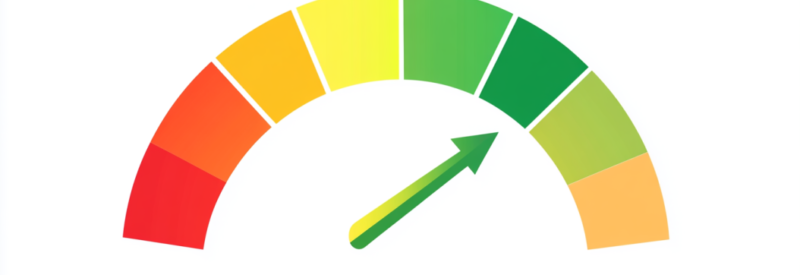
Whether your business recently opened its doors or already has years of operating under its belt, understanding your business credit score is essential. A high business credit can unlock additional business loan options, lower interest rates, and better insurance premiums, alongside a host of additional advantages. However, business credit scores operate differently from personal credit scores, so you can’t rely on your consumer credit score knowledge to help you build business credit. This guide explores everything you need to know about business credit scoring, including the factors determining scores, the benefits of a good business credit report, and methods to improve your business credit.
What Is a Business Credit Score?
A business credit score is a numerical metric communicating your business’s creditworthiness to lenders, insurers, vendors, and other stakeholders. Because your score conveys the likelihood of your business meeting its financial obligations, it’s one of the primary tools used to mitigate risk by parties interested in your business.
Credit reporting bureaus calculate business credit scores with a range of factors, such as on-time payments and debt levels. Lenders, vendors, and other business partners report your payments, loan details, and other factors to credit bureaus. In return, these credit reporting bureaus produce business credit scores.
Business Credit vs Personal Credit
Business credit scores relate to your business’s loans and credit accounts, while personal credit scores relate to your personal loans and credit accounts. In most cases, these scores do not relate to one another.
However, in some cases, a business credit card or business loan provider may report payment details to your business and personal credit files. Likewise, some business credit scores integrate data from personal and business credit files.
Finally, you can check consumer credit scores for free, but you may face some limitations when trying to obtain a free business credit report from one of the major business credit bureaus.
Is business credit necessary?
While new business owners can use their personal credit scores instead of their business credit scores, this blurs the line between personal and business finances. Additionally, a business credit score can make life as a business owner much less stressful. Once established, business owners can more easily acquire loans, trade credit, and access other financial benefits. For example, businesses with strong business credit can source supplies on credit, improving cash flow. The benefits of a good credit score favorably impact nearly every element of a business’s operations.
What Is a Good Business Credit Score?
Business credit scores are distributed across a different scale than personal credit scores. For example, you may be familiar with FICO’s personal credit score range of 300 to 850. However, the FICO Small Business Scoring Service (SBSS) ranges from zero to 300. If you don’t know the difference between personal and business credit score ranges, you may mistakenly assume your business’s score is poor when it’s actually quite favorable. Additionally, VantageScores are another type of credit score that are calculated differently than FICO scores, and therefore may show different results.
Below details what scores are considered “good” at three of the major business credit reporting bureaus:
- Dun & Bradstreet: Dun & Bradstreet assesses business scores on a scale of 1-100. Scores of 80 and above are good scores, while scores of 49 and below are considered high-risk scores.
- Experian: Experian business scores are assessed on a scale of 1-100, with an 81 or above considered a good score.
- Equifax: Equifax issues three types of business scores. Traditional business credit scores are assessed on a scale of 100-992, the Business Failure Score on a scale of 1000-1880, and the Payment Index Score on a scale of 0-100. Regarding the Payment Index Score, you should aim for a 90 or above.
Benefits of Having a Business Credit Score
Let’s explore the five primary reasons for building your business credit score:
Separation of business and personal finances
A business credit score simplifies the separation of your personal and business finances. For example, a limited liability company (LLC) business structure provides liability protections, but business owners still need to use their personal credit score to access loans, insurance rates, and other products if they haven’t established a business credit score. Once your business’s credit score is well established, treating your enterprise as an entirely separate entity is much easier.
Access to loans at better interest rates
Accessing business loans can be challenging for businesses without a credit track record. A business credit score makes it much easier to apply for business credit cards, business loans, and other financial services. Likewise, a higher credit score can result in lower interest rates, saving your business money on its financing costs.
Lower insurance premiums
One of the most overlooked benefits of a strong business credit score is access to better insurance rates. All responsible business owners utilize insurance to mitigate risk. However, if your business doesn’t have a credit score, various forms of insurance, including business insurance, can be more expensive.
Access to trade credit
“Trade credit” is business-to-business (B2B) credit, most frequently employed in a business’s vendor relationships. With trade credit, vendors provide your supplies and invoice your business. You must meet the payment obligations on the invoice to continue using this benefit.
If you want to purchase supplies without paying for the products upfront, trade credit is a helpful tool. However, vendors typically check your business’s credit before offering this benefit.
Improved business reputation
Unlike personal credit scores, anyone can look at business credit scores. While it might cost money to check your score, the data is publicly available. As such, a better business credit score is better for your business’s reputation.
How Business Credit Scores are Used
There are many ways business credit scores are used. Below explores the three most pertinent uses:
- Loan Approval: When you apply for a business loan, the lender checks your score to determine your business’s risk profile. Different lenders have different risk appetites, so make sure to research which lenders are likely to approve your business for financing with its current score.
- Trade Credit Approval: It’s not just financial institutions utilizing these scores to determine your business’s risk profile. You can expect the same from vendors extending credit. If you want to purchase supplies and services on account, many vendors will use your score to determine how much credit (if any) to offer your business.
- Insurance Risk Assessment: Insurance companies are in the risk business. They need to understand how much risk is involved in offering you a policy. If you want the best possible insurance rates, you need a “low-risk” profile. A good score exhibits your business’s dependability.
What Factors Determine Your Business Credit Rating?

Unfortunately, the precise algorithm used to calculate your business’s credit rating isn’t publicly available. Additionally, the algorithm varies depending on which credit reporting bureau calculates the score. However, the following factors are typically the most crucial:
- Assets: Any assets owned by your business that credit reporting bureaus can assess
- Outstanding Debts: Outstanding debts, such as credit cards, loans, and other forms of financing
- Payment History: Your business’s payment history, including missed payments
- Public Records: Liens, UCC filings, court judgments, and other public records
- Business Age: Amount of time your business has been in operation
- Business Revenue: Amount of money your business generates
- Industry Risk: Your business’s industry and its risk assessment
Business Loan Credit Score Requirements
Business owners interested in credit scores are often searching for business loans or other forms of financing. While each lender has its own requirements, a “good” business credit score is 80 and above. Aim for this mark if you want easy access to loans.
If you don’t have a business credit score but need access to a loan, your personal credit score needs to be strong. For example, while the Small Business Administration (SBA) does not have specific credit score requirements, it’s generally thought that you need above a 650 for a chance at landing its loan products.
What is the minimum business credit score needed to get a business loan?
Again, the minimum business credit score you will need to get a business loan depends on the lender. As scores below 50 are thought to indicate your business is “high-risk,” it’s safe to say you will want a score higher than this.
What Is a Business Credit Report?
A business credit report or credit file is a document outlining the credit details of a registered business. These reports are available from Equifax, Experian, and Dun & Bradstreet.
While a business credit report includes a business credit score, it also includes many other details. This is what makes these reports so useful for anyone seeking a business’s financial information. While the exact details on a report vary depending on the credit reporting bureau, they typically include information previously discussed in this guide, such as outstanding debt, public records, revenue, payment history, and more.
Business Credit Reporting Bureaus
Four major credit reporting bureaus collect data on businesses’ creditworthiness. Let’s take a look at each of these organizations in more detail:
Dun & Bradstreet
While Dun & Bradstreet doesn’t provide a large number of consumer services in the United States, it’s famous for its business credit scores. Dun & Bradstreet issues PAYDEX scores to indicate the creditworthiness of a business.
Experian
Experian is another credit reporting bureau offering clients consumer and commercial credit reports. Its comprehensive business credit reports include details such as risk factors, financial information, liens, judgments, UCC filings, ownership, parent companies, and more.
Equifax
Equifax is a credit reporting bureau providing consumer and commercial credit reports. First opening its doors in 1899, the company now offers business credit reports.
TransUnion
While TransUnion is one of the major credit reporting bureaus in the United States, this is only true for consumer credit reports. At present, the company does not issue business credit scores.
3 Reasons to Check Your Business Credit Score
Many business owners make the mistake of not checking their business credit scores routinely. While checking your score can cost you money, the many benefits of monitoring your score are impossible to ignore. Below are the top three reasons to keep tabs on your business credit file:
1. Check for mistakes
Mistakes can happen. In fact, plenty of news stories detail credit reporting agencies making mistakes. This year, Equifax is suspected of having issued incorrect credit scores for as many as 300,000 consumers, which may have impacted their ability to access loans and other forms of credit.[1]CNN. “Equifax Issued Wrong Credit Scores for Millions of Consumers“. Accessed August 30, 2022. To prevent a mistake from ruining your score and ability to access capital, simply check your report.
2. Monitor fraud
Keeping tabs on your credit file is one of the best ways to monitor fraud. If someone attempts to open a credit card, obtain a business loan, or access any other type of financial service in the name of your business, it should appear on your report. Also, it might be a sign of fraudulent activity if you have unknown accounts on your credit file.
3. Pre-application preparation
Lastly, knowing where you stand is essential if you plan on applying for financing. Many lenders will have minimum credit score requirements, so checking your score in advance will help you determine your business’s eligibility.
How To Check Your Business Credit Score

In the United States, the federal government requires the leading credit bureaus to provide consumers with one free credit score per year. However, this benefit is not guaranteed to businesses. Checking your business’s score is simple, but may cost money.
Below, let’s take a look at the best ways to check your business credit score with the leading credit reporting bureaus:
Dun & Bradstreet
Accessing your Dun & Bradstreet business credit report isn’t cheap. The company offers a CreditBuilder Plus program costing $149 per month.
Dun & Bradstreet offers a free credit monitoring product called CreditSignal, but this only informs you of changes to your credit file. It won’t provide an in-depth assessment of your report. However, if you sign up for CreditSignal, you will be able to access your score for 14 days, so this is a good option if you want to monitor your business credit score for a limited time.
Equifax
Business credit reports are available directly via Equifax’s website. Your report will cost you $99.95. Equifax also offers credit report alerts for small business owners wanting to stay on top of their credit.
Experian
Experian offers its credit reports directly through its website. You can access a one-time basic report for $39.95, making this the cheapest credit bureau in terms of credit report price. Additionally, you can purchase a more in-depth report for $49.95.
How Do I Establish and Build Business Credit?
Establishing and building business credit can be a lengthy process. While building a strong credit score won’t happen overnight, starting now will help you avoid problems in the future. Let’s take a look at some key tips for building your business’s credit:
Legally register your business
Business owners should make it as simple as possible for credit reporting agencies to collect and process data about their businesses. By legally registering your business, you create a formal entity credit bureaus can use to associate with payments, loans, and other forms of credit-building financing.
Business credit scores are tracked using employer identification numbers (EINs), which you can apply for on the IRS website. When you apply for loans or other funding for your business, lenders will request your EIN so they can report your payment history to the relevant credit reporting organizations.
Open a business bank account
Next, open a business bank account. Not only will this make it easier for you to process business transactions and separate your personal finances, but it will help legitimize your business in the eyes of credit reporting bureaus.
Need some help opening a business bank account? Start by reading the Top 10 Best Business Bank Accounts in 2022!
Pay on time
Whether it’s an internet bill for your office space or an invoice for new materials, pay your bills. Unpaid bills can damage your credit score. In fact, one of the leading contributors to your credit score is your ability to pay your bills on time.
Check your scores
While checking your business credit score costs money, it’s essential to check for mistakes. If you do find an error on your credit report, you can file a dispute for removal.
Open net-30 accounts
One of the best ways to build business credit is by opening a net-30 or net-60 account with a vendor. Typically, vendors report on-time payments to credit bureaus, meaning you can build credit when using net-30 or net-60 accounts to purchase supplies.
Apply for loans, lines of credit, or business credit cards
Responsibly applying for loans, lines of credit, and other business credit can help you build your score. While an inquiry on your credit file can cause a small, short-term reduction in your score, the long-term benefits of taking out credit are worth it. That is, as long as you can meet your financial obligations.
How to Improve Your Business Credit Score
If you have a business credit score, but it isn’t at the level you need it to be, here are three tips for improvement:
1. Identify mistakes
First, check for mistakes. As previously mentioned, incorrect inquiries and other mistakes can damage your score. Likewise, checking your report for any unknown accounts can help your business discover fraud and other pitfalls.
2. Use credit-building or credit-repair software
If you want to improve your business credit without hiring an expensive credit repair service to do the job, credit repair software is a good alternative. This software analyzes your business credit report, drafts dispute letters, and helps you remove negative items from your credit file.
3. Eliminate revolving credit debt
Too much revolving debt can damage your credit score. Lenders want to know you can use credit responsibly, which means you should keep your credit utilization to a minimum. As with personal credit cards, keeping your business credit card utilization below 30% can help you maintain a strong business credit score.[2]Forbes. “What Every Small Business Owner Should Know About Credit Utilization“. Accessed August 30, 2022.
Note: To improve your personal credit score, you may consider freezing your credit. However, business credit scores cannot be frozen.
Business Credit Scores & Reporting:
Final Thoughts
Now that you understand the importance of business credit scores, you’ll never again underestimate the power of having good business credit! However, simply understanding the importance of your business’s credit score doesn’t immediately gift you with a stellar score. As the saying goes, Rome wasn’t built in a day.
You already know the many benefits of a solid business credit score, but did you know a payment solutions provider can help you access these benefits sooner? By partnering with a payment solutions provider, you can access favorable rates for business funding, even as you’re establishing and building your business credit.
Business Credit Score FAQs
Can I get a business credit score for free?
No. Unfortunately, no law requires credit bureaus to provide free business credit scores. However, some bureaus offer a free trial period for business credit monitoring services.
How are business credit scores calculated?
While the exact algorithm isn’t public, business credit reporting agencies utilize a range of data points to calculate your score. Standard data points include:
- Business age
- Outstanding debts
- Payment history
- Public filings
- Industry risk
- Revenue
- Assets
Is my business credit score public information?
Yes. Unlike consumer credit scores, which require permission to access, anyone can obtain your business credit report.
Can I get a business loan with a low credit score?
A low business credit score can make it more challenging to access business funding. However, you can still find lenders that may offer loans to applicants without strong business credit. Keep in mind that you might be required to offer collateral or pay a higher interest rate.
What are the business credit score ranges?
The business credit score ranges differ depending on the credit reporting bureau. With Experian and Dun & Bradstreet, scores range from one to 100. With Equifax, the Payment Index Scores range from zero and 100, the traditional credit score ranges from 100 to 992, and the Business Failure Score ranges between 1000 and 1880.
Does an LLC have its own credit score?
Yes. If you register your business and obtain an EIN, your LLC will have its own credit score.
How long does it take to build business credit?
The length of time it takes to build business credit varies depending on how proactive you are. If you use vendors that report to credit bureaus, you can begin building credit after just a few months. However, it will take at least a year until you can establish a strong credit history.
How do I use my EIN number for credit?
You provide your EIN when you apply for loans, bank accounts, and other credit accounts. This number identifies you to credit reporting bureaus.







